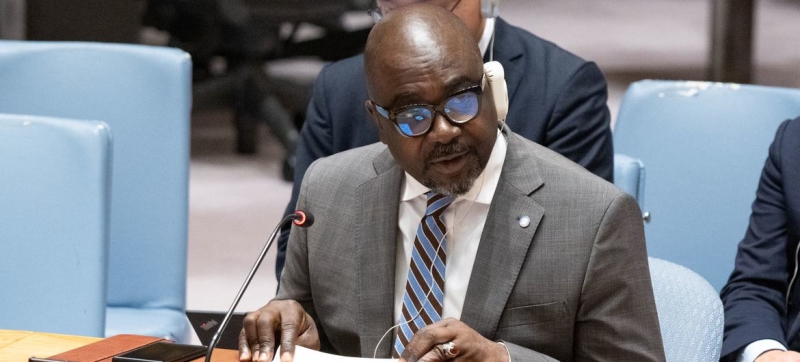
UN Deputy High Representative for Disarmament Affairs Adedeji Eboh. Ukraine: UN Security Council announces civilian casualty figures amid escalating attacks Peace and Security
Russia’s full-scale invasion is causing enormous suffering to the people of Ukraine, and the security situation in the country continues to deteriorate. Escalating attacks on Ukrainian regions have resulted in an increase in civilian casualties, as well as widespread destruction of civilian infrastructure, including energy, medical, and educational facilities.
The UN Deputy High Representative for Disarmament Affairs Adedeji Eboh made this statement at a Security Council meeting convened at Russia’s initiative. He recalled that, according to the UN Human Rights Office (OHCHR), 11,662 civilians have been killed in Ukraine since February 24, 2022. Moreover, July 2024, when 219 people were killed, became the most fatal month in almost two years (since October 2022).
Ebo noted that the UN Secretary-General is seriously concerned about the impact on civilians of the escalation of hostilities in eastern Ukraine, as well as in the area of the Ukrainian-Russian border, including in the Kursk and Belgorod regions of the Russian Federation.
“He calls on everyone to act responsibly and ensure the protection of civilians and civilian infrastructure,” Ebo said on behalf of the Secretary-General. All parties to the conflict have a responsibility to protect civilians and civilian infrastructure, he added.
Military assistance and arms transfers
Ukraine receives military aid – weapons and ammunition – from various governments, Ebo noted. The assistance reportedly included conventional heavy weapons such as tanks, armoured fighting vehicles, combat aircraft, helicopters, large-calibre artillery systems, missile systems and unmanned combat aerial vehicles, as well as remotely controlled munitions, small arms and light weapons and their ammunition.
There have also been reports that states are transferring or planning to transfer weapons to Russia, including unmanned aerial vehicles, ballistic missiles and munitions, and that these weapons are being used in Ukraine, Ebo said.
“I reiterate that any transfer of arms and ammunition must be in accordance with the applicable international legal framework, including of course the relevant Security Council resolutions,” the Deputy High Representative for Disarmament Affairs said.
Cluster Munitions and Mine Contamination
Ebo said reports of cluster munitions and mine and explosive remnant contamination of Ukrainian territory were deeply concerning.
He called universal participation in the Anti-Personnel Mine Ban Convention, the Convention on Cluster Munitions and the Convention on Certain Conventional Weapons a priority.
“I call on all States to honour their obligations under these treaties and reaffirm their value and importance,” he said. Ebo called on states to exercise maximum responsibility when transferring weapons and ammunition.
Diversion of weapons
He also noted that weapons and ammunition could be diverted to unauthorized end users.
“Measures to prevent and mitigate the risk of diversion of weapons and ammunition are key to preventing further instability and insecurity in Ukraine, the region and beyond,” he stressed.
Drones
The use of armed drones and missiles by the Russian Federation continues to kill and injure civilians and damage civilian infrastructure in Ukraine, Ebo said.
In addition, he noted, there have been reports of a number of cross-border strikes using missiles and drones launched by Ukraine into the territory of the Russian Federation, some of which, according to Russian authorities, allegedly caused civilian casualties.
“Like any other weapon or weapon system, armed drones and missiles must not be used in a manner inconsistent with international humanitarian law,” Ebo said.
“I want to reaffirm the commitment of the United Nations to supporting all meaningful efforts to establish a just and lasting peace in Ukraine, in accordance with the UN Charter, international law and the relevant General Assembly resolutions. The time has come to end this conflict,” he concluded.
